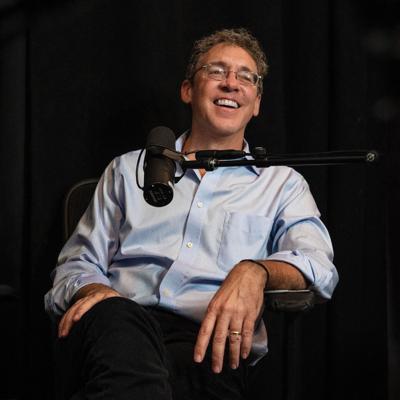
Lee C. Camp
Lee C. Camp is no stranger to the microphone, though usually he’s the one asking questions rather than answering them. Sitting in the back of The Well, a mission-driven cafe on the Lipscomb University campus, he talks entirely on the record — aside from a few stray tangents into politics (both church and partisan). Camp quickly shows off a tendency toward vulnerable and sincere connection, which has helped him become a radio juggernaut.
“ I kind of lived in anxiety for much of my life, and I can still kind of fall into that,” he says. “I’m thankful that that’s not where my day-to-day life is much these days.”
Camp talks for nearly an hour about the gradual — then suddenly sharp — rise of his podcast No Small Endeavor. Its nuanced, good-faith conversations about life’s biggest questions produce a kind of salve for today’s high-stress media environment; taken together, episodes offer notable guests’ credible responses to the existential anxiety shared by all humans.
Camp first started converting lengthy interviews into a regular podcast more than 20 years ago from his perch at Lipscomb, the school that brought Camp from Alabama to Nashville as an undergraduate in the 1980s. Camp earned a bachelor’s degree in computer science at Lipscomb in 1989, then returned as a faculty member in 1999. His academic work builds theological arguments that compel Christians to adopt a more empathetic and peace-seeking faith against divisive, sometimes violent alternative loyalties like nationalism, racism, Islamophobia and greed.
That kind of theology shoots through his podcast, constantly informing questions of human existence and ethics. Yet he keeps Christianity specifically at bay, treating it as more of a reference library than a recommendation.
“ A lot of the conversation you have in ethics is asking the big perennial questions about, ‘What does it mean to live a good life? What kind of life is life worth living?’” Camp explains. “Everybody cares about those questions, and unfortunately not all of us allow ourselves sufficient time to think about those questions. We talk to Christians, Buddhists, Muslims, Hindus. We talk to agnostics and atheists. We’re looking for people who have something compelling to say about taking life seriously, because a lot of people don’t take their own lives seriously.”
Hundreds of guests have sat opposite Camp for interviews that quickly plunge into big questions and honest reflections about human existence. The Public Radio Exchange (PRX) picked up No Small Endeavor in 2023 for national distribution after initial syndication by WPLN, Nashville’s NPR member station. The platform has put Camp in thousands of cars and kitchens across the country, and helped land guests like bestselling social science writer Malcolm Gladwell, former U.S. Poet Laureate Joy Harjo and The Office’s Rainn Wilson.
Camp explains that whether his guests are authors, CEOs, advocates or theologians, they often return to three common themes. The first is an eye toward intention.
“ A sort of self-interrogation asking, ‘To what degree, for example, do my daily habits, routines, dispositions fit with the kind of life that I’m trying to live?’” he explains.
The second theme, Camp says, is vulnerability — allowing others to see one’s mistakes and asking for help when it’s needed. The third is strong social relationships — specifically friendships.
The show’s philosophical wanderings make it a spiritual successor to Krista Tippett’s On Being; its hospitable warmth, inflected with American regionalism, sounds more like Garrison Keillor’s Prairie Home Companion, which Camp cites as initial inspiration. All have won dedicated audiences by combining universal appeal with a distinct character, often built around an inoffensive principal voice like Camp who can shrink the room enough to make a listener feel like they’re part of the conversation.
Southern influence, specifically from Nashville, shows up throughout. His episode list features local celebrities like Mayor Freddie O’Connell, author and advocate Cyntoia Brown-Long and Democratic state Rep. Justin Jones, also a trained Christian theologian. When asked about particularly notable guests, Camp immediately recalls the Rev. James Lawson, a key leader in the civil rights movement who was expelled by Vanderbilt for his activism in 1960.
“ We all have these huge questions about how to contribute something true or good to the world,” says Camp. “I asked him, ‘What did it do to you as a young person, getting arrested and sent to prison?’”
Camp’s face lights up, quoting from memory.
“ He said, ‘It liberated me for the rest of my life.’ I love hearing stories like that, because we all want to try to find a place of courage in ourselves.”
On Sunday, Nov. 23, No Small Endeavor will host its annual live show at the Schermerhorn Symphony Center with musical guests Ruby Amanfu and Allison Russell — both fellow Nashvillians. Camp will speak with Sharon McMahon, who has become a prominent public figure applying a similar reconciliatory approach to electoral politics.
Camp’s conversations recently have returned more to politics, which he regards as a public expression of moral values. Such topics “deeply distress” him right now, though Camp has written and studied and spoken against Christian nationalism for his entire career.
His show both transcends bare partisan debate and avoids it — a tension Camp clearly struggles with as a prominent American voice and white Southern Christian. For now, he lets others do that talking.





